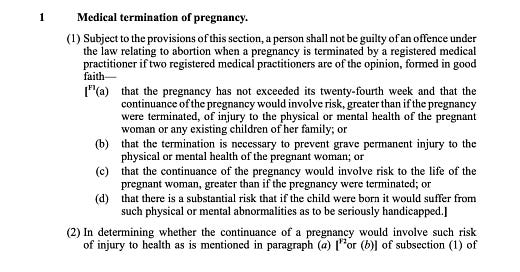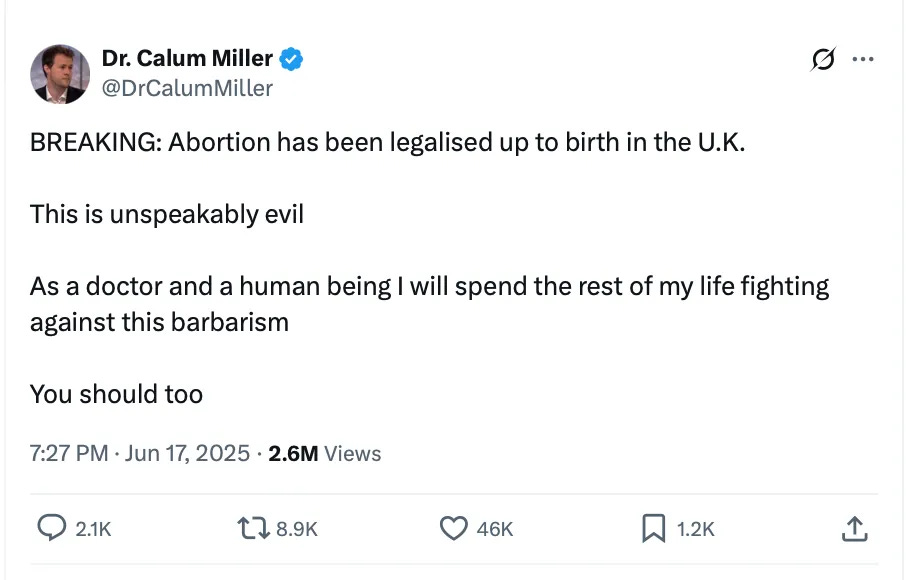No, MPs have not legalised abortion to birth
The USification of British political discourse continues apace
For nearly sixty years, reproductive rights have sat, in a typically British way, inside a paradox. Since the passage of the 1967 Abortion Act, the practice has both been ubiquitous, readily available and technically illegal. Unlike thirty-nine other European countries, which have legalised abortion on request in the first trimester, abortion in the UK (like Finland) remains a criminal act, excused only for social and medical exemptions, including the impact on a woman’s mental health. In practice, this weird stasis has created a stable regime on reproductive rights in Britain, with a more liberal time limit available than most comparator European states. In France and Germany, for example, the limit sits at 14 and 12 weeks, respectively.
In recent years, however, problems have arisen. After the 24 week limit, women are subject to the vagaries of the 1861 Offences Against the Persons Act. This Victorian era piece of legislation has seen women go to prison under its auspices for seeking a termination after the 24 week limit. This was already a problem for reasons I’ll outline below, but has become worse still following advances in medical technology in recent years, with the rise of at home abortion medication, available through the internet. As such, there have been a small number of harrowing cases where women have been sent to prison for obtaining a termination after the cut off, or for miscarrying/bearing a still-birth child and then facing investigation and even prosecution. To name a few examples, during the COVID pandemic Carla Foster obtained abortion pills by post after falsely stating she was within the 10-week limit—she was actually 32–34 weeks pregnant. She was sentenced to 28 months in prison. Then there was the case of Nicola Parker, she took abortion pills during lockdown and later delivered a foetus at 26 weeks, she was prosecuted for illegally procuring a miscarriage, faced years of legal uncertainty trauma before being found not guilty by a jury in 2025. In 2021, a 15-year-old girl who had an unexplained early stillbirth was subjected to a year-long criminal investigation that saw her text messages and search history examined. Physical examinations also took place. Police abandoned the case after a coroner concluded the pregnancy ended because of natural causes. It is hard to credit the trauma that that young woman must have experienced, something she will live with for the rest of her days. No wonder then that the British Medical Association, the Royal College of Midwives and the Royal College of Obstetricians and Gynaecologists had all called for abortion to be decriminalised, with the BMA on the record as saying the previous “punitive approach” inhibits the ability of doctors to provide medical care. All of this poses profound questions about the legal architecture which surrounds abortion, and whether it remains fit for purpose. This is the context of Tuesday’s vote in the House of Commons on an amendment to the Crime and Policing bill. This amendment decriminalises abortion for the woman concerned after the 24 week limit.
There are competing views about this, with no perfect answer. Reasonable people can prioritise different moral and political imperatives- but the reaction from much of the online radical right to the news of the amendment’s passing was disturbing. The Blue Tick brigade on X, augmented by many more once sensible centre-right commentators took to the platform to decry Britain’s descent to mass baby killing and proceeded to spread outrageous disinformation, seen by millions. Consciously or otherwise they recycled tropes about abortion long adopted by the hardline pro-life movement on the American right. Consider this single tweet, shared thousands of times by Dr. Calum Miller, a self-described “Ethicist and Philosopher” and medical doctor.
One would hope for a little more reason and a little less invective from either a philosopher or a doctor, certainly both. Even worse, former cabinet minister Jacob Rees Mogg took to GBNews lambasting a “cult of death.” If there were ever any doubts about his suitability for high office, this absurd verbal spasm should have ended them.
For the avoidance of doubt: Abortion in Britain has not been legalised up to birth. It will remain illegal for any medical practitioner to provide it after the time limit as set out in the Abortion Act and they could face prosecution if they do. What will change is the possibility of prosecution for the small number of women caught up in Victorian-era legislation, women who are often vulnerable, young, poor or destitute- ending up in court for an act born of the terror of what might be, or for something outside of her control. Imagine the horror of a young woman being forced to explain herself, her medical history, the facts and realities of her body to the state, to avoid prison time. It is a theocratic nightmare. That, and that alone is what Parliament has sought to change. The idea that this will unleash a wave of women aborting viable babies just before due date is absurd and offensive. The idea that this is a legalisation of abortion on demand is absurd and offensive. Worst of all, it all yet another reminder of the unfortunate MAGAification and debasement of British political discourse- the ongoing online pickling of a certain type of increasingly extreme radical right brain.
The change is not without political risk: that it brings into contestation the abortion regime, in a way in which it has somewhat uneasily resisted contestation before. It is possible that radical right forces use this moment to try and argue that the overall abortion framework should be revisited, or the time limit should be reduced. But then there are those who believe that with the increasing influence of the pro-life right in Britain, with even JD Vance commenting about UK buffer zones around abortion clinic, that this turn is coming anyway and it is better to get ahead of it: to try and cement those rights while there id a government willing to do it. Having seen the nightmare of abortion politics and the terror of theocracy in women’s lives in the United States, I both understand that impulse and hope deep to my bones that they are right. Regardless, the current regime, and the inquisition it unleashes on a handful of women, was a moral and political disgrace, and it says much about many of the commentators who bloviated on the matter that they not once seemed to enter their thinking. All that mattered was their ersatz-MAGA culture war outrage and the clicks they could generate with it.
There is one argument, however, to which I am more sympathetic. This change was rushed through Parliament with barely a couple of hours of debate. This was not done because the proponents wished to avoid scrutiny, but rather is a product of the arcane parliamentary way in which we deal with “matters of conscience.” Because the government will never bring forward changes in government time, the only hope of changing the law on matters such as abortion or assisted dying or gay marriage is for a so-minded MP to win the Private Members’ Bill ballot, introduce the change themselves (a very rare opportunity), or for MPs to amend a government bill in the way they are doing here. The latter route means that parliamentary time and scrutiny will inevitably be limited. This does nothing for the legitimacy of the change. I have long thought that the quasi-religious hangover of “morality votes” in the Commons is one of the most unthinkingly overrated elements of the British constitution. If a change is worth doing, it’s worth the government driving the change itself and arguing for it accordingly. I also fail to see why abortion, something completely central to women’s rights, can be left in a separate sphere of politics, nor why it is any more or less inherently a matter of morality than any other sphere of political decision making.
Either way, Parliament did the right thing on Tuesday. They should be commended and those who spread lies for their own purposes, thoroughly ashamed.
PS If you want to see the end point of the weaponisation of the state for “pro-life” purposes against women, do watch my special News Agents documentary on the state of abortion rights in Florida and the Deep South, from last November.






Lewis, you are the voice of reason and I wish there were more like you in our media. (And it’s always nice to see a Brummie boy done good 😉).
I think that Twitter (X) has A LOT to answer for, and it doesn’t help that so many journalists and politicians remain extremely active on there, even after its devolution into a far right hellhole. No wonder our discourse is becoming more and more Americanised. And let’s face it, many of the people pushing these narratives are, quite simply, fucking WEIRDOS. Obviously they’re entitled to their opinions, but I’d like to think we’re better than devolving into American-style polarisation.
Good piece. Another example of weaponising an issue with sound bites, flooding the zone with BS, and competing for clicks rather than having serious and thoughtful commentary such as you have provided. Surely an issue that benefits from reasoned and thoughtful discussion rather than firehoses of vitriol. But that is our media and politics now, god help us.